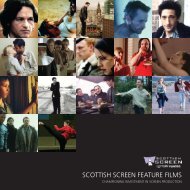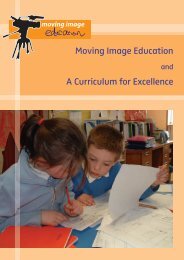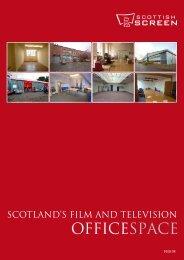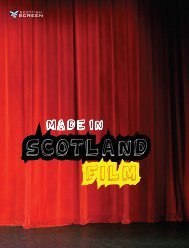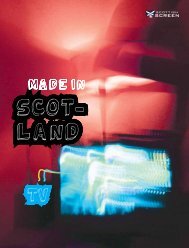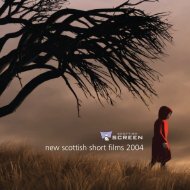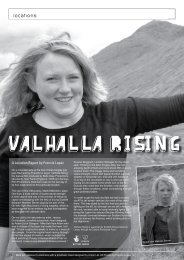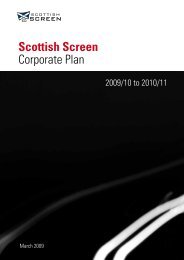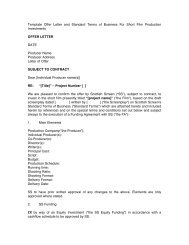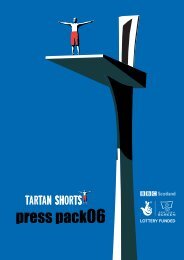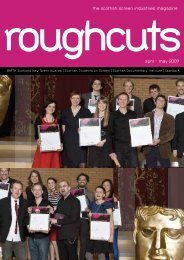Evaluation - Scottish Screen
Evaluation - Scottish Screen
Evaluation - Scottish Screen
Create successful ePaper yourself
Turn your PDF publications into a flip-book with our unique Google optimized e-Paper software.
pupils’ reactions to lead practitioners and teachers’ teaching within MIE were also included.<br />
Finally, in this section, teachers were invited to reflect on whether or not the programme had<br />
any impact on pupils critical awareness of themselves, school, and events in the world in<br />
general.<br />
The fifth theme in the teachers’ interview schedule concerned the personal and professional<br />
impact of the programme and was directly related to the research question on the same theme.<br />
The questions in this theme related to teachers’ personal enjoyment and appreciation of film<br />
and other media and any impact that the programme may have had on their critical<br />
connectedness with events in school and the world in general.<br />
The final theme related to sustainability of the programme. Questions in this section invited<br />
teachers to give their views on the strengths and shortcomings of MIE, how it relates to other<br />
curricular areas and what would be required for MIE to become sustainable in their schools.<br />
Interview schedules were also constructed for headteachers and school managers using<br />
similar themes and questions (see Appendix 4). Two other themes were included in the<br />
headteachers’ and school managers’ interviews. These related to management of the<br />
programme in which headteachers were invited to report on support for the project from<br />
within and without the school, staff development and response from the local authority to the<br />
initiative. The second additional theme included questions regarding headteachers’<br />
perspectives on improving design and delivery of the programme, the preparation of teachers<br />
to teach MIE, sustainability and critical connectedness.<br />
Similarly, interview schedules were constructed for lead practitioners (see Appendices 5 and<br />
6).<br />
Observation schedules were also constructed in order to gather data on the nature and purpose<br />
of activities that took place in MIE classes and the time spent on them. Field notes were also<br />
made regarding observation of lead practitioners, teachers and pupils (see Appendix 7).<br />
Focus group themes were developed for pupils under three themes: their initial reaction to<br />
MIE, any impact it may have had on their learning, and whether or not it has had any impact<br />
on their attitude towards school and learning (see Appendix 8). Similar themes and prompts<br />
were used as the basis for semi-structured interviews with parents (see Appendix 9).<br />
In all cases, appropriately amended versions of the instruments were used for the second<br />
round of interviews, observations and focus groups (see, for example, Appendices 3 and 6).<br />
3.4 Participants<br />
The Professional Development Programme built on <strong>Scottish</strong> <strong>Screen</strong>’s Teacher Education<br />
Programme (TEP). The Programme entailed Film professionals working alongside<br />
Education professionals in order to explore aspects of media that might be taught, how they<br />
might be taught and how media literacy could become embedded in the curriculum in<br />
<strong>Scottish</strong> primary and secondary schools. Within the Teacher Education Programme, media<br />
education was defined as exploring, analysing and creating media artefacts. This was similar<br />
to Ofcom’s definition of media education as encompassing, access to, understanding and<br />
creation of media artefacts and corresponding to levels of media literacy that have been<br />
14




